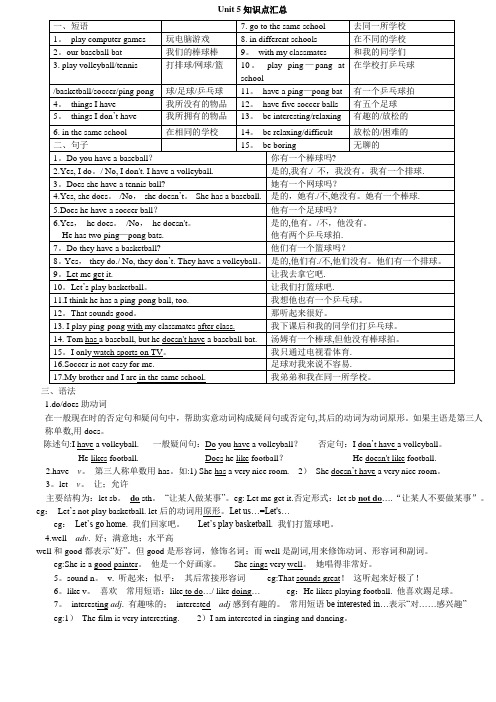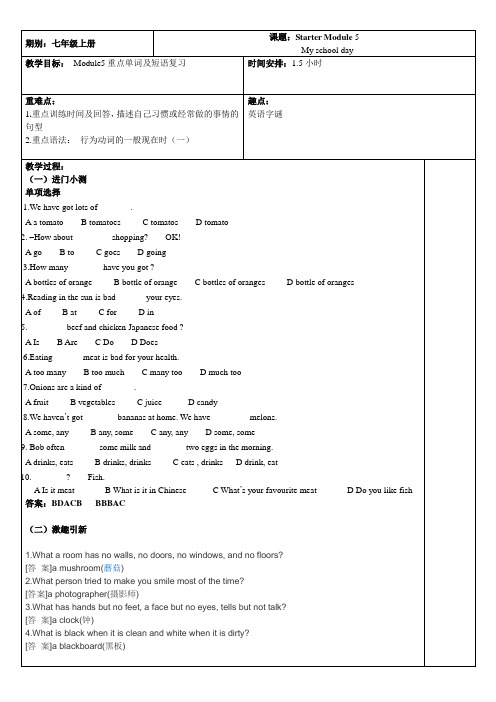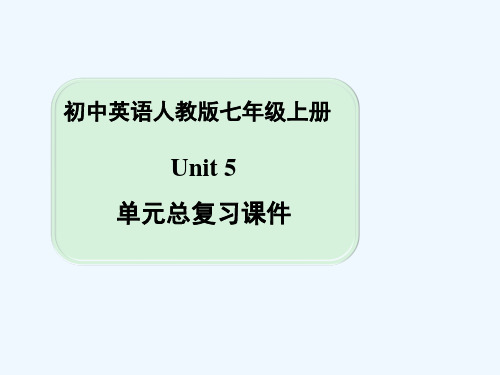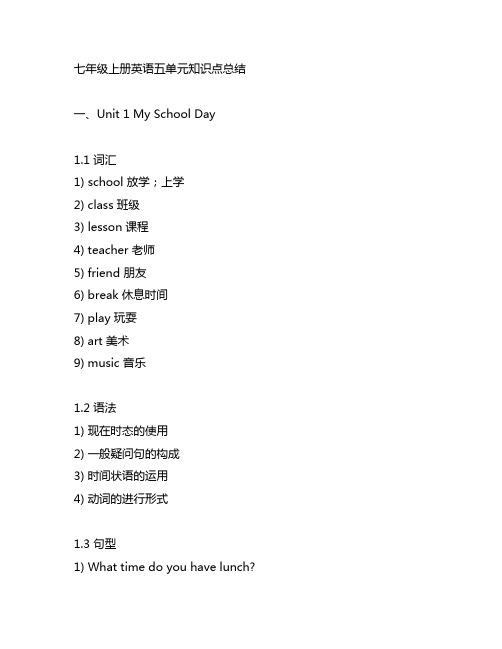七年级英语上册 Unit 5-Unit 9 考点讲义
Unit9单元高频考点总结课件2022-2023学年人教版七年级英语上册

最高级的变化。
例句:--What subject do you like best?
--My favorite subject is math. 我最喜欢的学科是数学。= I like math best.
--What’s Gina’s favorite subject? Gina最喜欢的学科是什么?
高频考点精讲
考点13:
good相关短语
1. be good with sb 和某人相处得好(同义get on well with sb.)
例句:He must be good with kids.他肯定能和孩子相处得好。
2. be good to sb 对某人好
例句:My friend was good to me when I was ill.我生病时我的朋友对我关怀备至。
play soccer 踢足球
高频考点精讲
考点11:
join / take part in / join in
1. join多指参加某个团体或组织,成为其中的一员join the Party入党;join the army参军
例句:He joined the photography club last week.他上周加入了摄影俱乐部。 Mary joined the debate team.玛丽加入了辩论队。
① talk to sb. 对某人说话 ② talk with sb 同某人交谈 ③ talk about/on… 谈论……
4)tell“告诉,讲述”。常用的结构:
① tell sb. sth. = tell sth. to sb. 告诉某人某事 ② tell sb. about sth. 告诉某人关于某事 ③ tell sb. to do sth. 告诉某人去做某事 tell sb. not to do sth. 告诉某人不要做某事 ④ tell a story 讲故事tell a lie 撒谎tell the truth讲实话
Unit9 重点知识复习课件 人教版英语七年级上册

Unit 9 My favorite subject is science.
基础夯实
【重点单词短语过关】 读一读 背一背
favorite /'feivərit/ adj.&n.特别喜爱的 (人或事物) subject /'sʌbdʒekt/ n. 学科;科目 science /'saiəns/ n. 科学
单词和短语精讲
(4)连接两个不同的名词,如:She moved from a house to a building. 她从平房搬到了楼房。 It’s quite a long way from Beijing to Guangzhou.从北京到广州有很长一段路。 (5)连接两个反义的名词,如:We’ve been working from morning to night. 我们从早工作到晚。 (含有这种搭配的词组还有:from first to last自始自终;from start to finish从开始到结束;from beginning to end从头到尾;自始自终;全部 ;from top to bottom从头到尾;从顶到底) (6)接表示地点的副词和名词,如:It’s only two hundred metres from here to my home. 从这里 到我家仅有两百米远。
单词和短语Leabharlann 讲3.from...to... 从......到......的用法。 from…to…”是英语中极其常用的介词短语,表示“从…到…”,其用法很多,搭配能力也很 强。本文现就其搭配形式归纳如下: (1)连接两个不同的数词 例如: Can you count from one to a hundred? 你能从一数到一百吗? Men from 16 to 30 are to be drafted into the army. 16岁到30岁的男子均应该应征入伍。 (2)接两个不同的数字,用于复数名词前, 例如:The work should take us from two to three hours. 这工作要用去我们2至3小时。 The nursery is open to children from 2 to 6 years old. 这所幼儿园对2岁到6岁之间的儿童 (3)连接两个相同的名词 例如:The paper was passed from hand to hand. 这份文件从一个人手里传到另一个手里。
Unit 5 知识归纳人教版英语七年级上册

Name: ________ Class:______Unit 5 知识归纳一、重点短语。
1.play basketball 打篮球2.play soccer/football 踢足球3.play volleyball打排球4.tennis racket网球拍5.baseball bat棒球棒6.ping-pong bat乒乓球拍7.be late for school上学迟到8.Let’s go! 我们走吧!9.Let me get it. 让我去取吧。
10.L et’s watch TV. 让我们看电视吧。
11.go home 回家12.That sounds interesting/ relaxing/boring/ difficult/good/ great.那听起来很有趣/放松/无聊/困难/不错。
13.go to the same school 上同一所学校14.in different classes 在不同的班级15.at school/ at home在学校/在家16.play with friends 和朋友一起玩17.watch them on TV 在电视上看他们18.It is adj. for sb. to do sth.= Doing sth. isadj. for sb. 做某事对某人来说怎么样19.课后/课前/课中after class/beforeclass/in class20.在教室里in the classroom21.p lay computer games 玩电脑游戏22.p lay/do/have sports 做运动三、作文范文。
My name is Gina. I like doing sports. It is interesting for me.I have eight tennis balls, two volleyballs and five soccer balls, but I don’t have a baseball. I have a good friend Jack. We are in the same school. He has a ping-pong ball and two ping-pong bats. After school, he can play it with his classmates. He thinks it’s relaxing. He likes basketball very much. But he only watches it on TV. It’s difficult.It’s time for sports. Let’s play soccer. Come on!。
人教版(PEP义务教育版)初一英语七年级上册人教版 Unit 5- Unit 9 名师教学PPT课

9.迟到 be late
.上美术课___h_av_e___ an art lesson
10.怎么样 how about
好好学习 天天向上
9
第二关:巧嘴快行动 (sentence competition)
好好学习 天天向上
10
重点句型
1.—_D__o you __h_a_v_e a basketball?你有篮球吗? —Yes,I ___d_o./No,I ___d_o_n.'t是的,我有。/不,我没有。 2.He ____d_o_e_sn__'t_l_ik_e__ vegetables.他不喜欢蔬菜。 3. __W_h_a_t_d_o___ you __h_a_v_e_f_o_r__ breakfast?你早餐喜欢吃什么? 4.I ___d_o_n_'t_w__a_n_t _to__b_e_ fat.我不想变胖。 5. __L_e_t'_s_t_h_in_k__a_b_o_u_t__ the food.让我们来想想(吃什么)食物吧。 6.—__C_a_n__I_h_e_l_p____ you?你想买点什么? —Yes,please.I __w__a_n_t a sweater ___f_o_r school.是的,我需要一件毛衣上 学穿。
n. health(健康)
healthy adj. 健康的
adv. healthily
反义词 unhealthy
go v. 走;去
好好过学去习式天天w向en上t 过去分词 gone
7
近义词 simple
easy adj. 容易的
反义词 hard/difficult
过去式 ate
fat adj. 肥胖的 woman n.女子
人教版七年级英语上册Unit5短语、句型、知识点总结

Unit 5知识点汇总三、语法1.do/does助动词在一般现在时的否定句和疑问句中,帮助实意动词构成疑问句或否定句,其后的动词为动词原形。
如果主语是第三人称单数,用does。
陈述句:I have a volleyball. 一般疑问句:Do you have a volleyball?否定句:I don’t have a volleyball。
He likes football. Does he like football?He doesn't like football.2.have v。
第三人称单数用has。
如:1) She has a very nice room. 2)She doesn’t have a very nice room。
3。
let v。
让;允许主要结构为:let sb。
do sth。
“让某人做某事”。
eg: Let me get it.否定形式:let sb not do….“让某人不要做某事”。
eg:Let’s not play basketball. let后的动词用原形。
Let us…=Let's…eg:Let’s go home. 我们回家吧。
Let’s play basketball. 我们打篮球吧。
4.well adv. 好;满意地;水平高well和good都表示“好”。
但good是形容词,修饰名词;而well是副词,用来修饰动词、形容词和副词。
eg:She is a good painter。
他是一个好画家。
She sings very well。
她唱得非常好。
5。
sound n。
v. 听起来;似乎:其后常接形容词eg:That sounds great!这听起来好极了!6。
like v。
喜欢常用短语:like to do…/ like doing…eg:He likes playing football. 他喜欢踢足球。
7。
interesting adj. 有趣味的;interested adj感到有趣的。
Module5讲义七年级英语上册

(三)新课讲授
规则:老师说出模块重点单词的中文,学生分成两队轮流回答相应中文对应的英文单词(拼写);回答正确可得2分,回答错误则答题权归对手,对手回答正确分数翻倍,可得4分,回答错误,不加分不扣分。
1一半half
2晚于,过几点past
3地理geography
4历史history
5信息技术IT
6数学maths
7科目subject
8因为because
9有趣的interesting
10工作日weekday
11困难的,难懂的difficult
12学习,工作work
13休息break
14在星期五下午on the Friday afternoon
15最喜爱的科目favourite subject
16和某人谈话talk with sb.
17擅长……be good at
18对某人来说困难be difficult for sb
19在工作日on weekdays
20休息have a break
21开始工作start to work
第二环节:知识点梳理
(1)时间表达法
ten ten(或者ten past ten)seven fortyfive(或者fifteen to eight)
注意:≤半小时,分钟past 点钟
≥半小时,分钟to 下一点钟
Ⅰ. 写出下列时间的表达法
1) 7:00 ____seven o’clock
2) 9:30 __half past nine__
3) 6:20 _twenty past six_/six twenty_
4) 11:10 _ten past eleven_/eleven ten_。
Unit5讲义人教版英语七年级上册

U5 Do you have a soccer ball必会内容:1学会一些运动项目的名词:soccer ball, tennis, pingpong ball, volleyball等2.掌握句型:“Do you have …? Does he/she have…?3.学会用have对物品的所属进行提问与问答。
4.学会使用描述形容词对事物做出。
5.学会句型“let’s“提建议并在情景中运用。
一.单项选择。
一、单项选择。
( ) 1. The English song ______very nice. Can you guess who is singing?A. smellsB. tastesC. soundsD. feels( ) 2. Let’s ______this song together.A. singsB. singC. singingD. to sing( ) 3. ______ you have a new basketball?A. IsB. AreC. DoD. Does( ) 4. –Let’s play pingpong!–Good idea, ______ I don’t have a bat.A. soB. orC. andD. but( ) 5. Let______ have a look at your sweater.A. myB. meC. ID. mine( ) 6. I only ______that famous star ______TV.A. watch, onB. watch, inC. see, atD. see, in( ) 7. –Do you know his name?–No, I ________.A. am notB. don’tC. can’tD. do ( ) 8. Zhang Wei ______an English dictionary.A. doesn’t hasB. haveC. doesn’t haveD. don’t have( ) 9. –Can you go to the movies ______ me?–Sure. Let’s go.A. withB. forC. toD. on( ) 10. –Do you have a puter game?–_____.A. Yes, it is.B. Yes, I have.C. No, I haven’tD. Yes, I do( ) 11. –Let’s _____pingpong ball. It’s time to have class.–All right.A. aren’t playB.doesn’t playC. don’t playD. not play( ) 12. –Does Anna have a pencil case?–______.A. No, she doesn’tB. Yes, she doC. No, she doD. Yes, she doesn’t( ) 13. –Let’s go to play football.–______.A. Not at allB. Thank youC. That sounds goodD. Good luck( ) 14. –Does your brother have a soccer?–Yes, but he doesn’t play sports. He only______ them on TV.A. watchB. watchesC. look atD. looks( ) 15. –Can Sally play_____ basketball?–No, she can’t.A. theB. aC. anD. /二、用方框中所给词的适当形式填空。
人教版七年级上册英语全册Unit 1-Unit 9 知识点总结

人教版七年级上册英语全册Unit 1-Unit 9 知识点总结Unit 11.询问对方姓名:(1)你叫什么名字?What’s your name?——我叫……。
My name is…/ I’m…(2)他/她叫什么名字?What’s his/ her name?——他/她叫……。
His/ Her name’s …(3)询问姓/名:What’s your first name/last name?你姓什么/名字是什么?——My first/last name is……2. 确认对方姓名:(1)你叫……吗?是的/不是Are you…? ——Yes, I am./ No, I’m not.(2)他/她叫……吗?是的/不是 Is he/she…?——Yes, he/she is. /No, he/she isn’t.3. 句型转换(1)改为一般疑问句:1)句子中含有be动词,情态动词等,变为一般疑问句时,把be动词,情态动词等词提前,句子其余部分照抄。
2)句子中不含以上词汇,变为一般疑问句就在句首加do或does,其余照抄。
(2)改为否定句1)句子中含有e动词,情态动词等,变为一般疑问句时,直接在e 动词,情态动词等后面加not,句子其余部分照抄。
2)句子中不含以上词汇,变为一般疑问句就在句首加do not(=don’t)或does not(=doesn’t).4. 人称代词5. it’s 与itsit’s = it is意为“它是”。
it是人称代词(第三人称单数形式)。
its是形容词性物主代词,意为“它的”。
e.g. 它是一只猫,它的名字叫咪咪。
It’s a cat. Its name’s Mimi.6. first name(=given name) 名;last name (=family name)姓e.g. I’m Jack Miller. My last name is Miller. 我叫杰克·米勒,我姓米勒。
人教版七年级上册英语unit1--unit9知识点

七年级上册英语知识点Unit1【短语归纳】1.yourname你的名字2.firstname名字stname姓氏4.hername他的名字1.——2.—3.I’4.What6.What7.——It’【短语归纳】1.haveagoodday过得愉快2.twonicephotosof……两张好看的…照片3.inthefirstphoto在第一张照片上4.inmyfamily在我的家庭里5.thenameof…..……的名字6.aphotoofmyfamily一张我的全家福【典句必背】1.That’smyfamily.那是我的家庭。
2.Thosearemyparents.那是我的父母。
3.……thesearemybrothers.……这些是我的兄弟。
4.—Who’sshe?她是谁?—She’smysister.她是我的姐姐(妹妹)。
5.……thisismysisterKate.…..这是我的姐姐(妹妹)凯特。
6.—Nicetomeetyou,Jane.见到你(我)很高兴。
—7.——9.Hi,I5.Anna9.ask…【用法集萃】1.Whatabout+doingsth.?做某事怎么样?2.Thankyoufor….为…..而谢谢你。
3.Howdoyouspell…..?你怎么拼写……?4.callsb.at+电话号码拨打电话找某人5.sb.mustdosth.某人必须做某事【点句必背】1.—Isthisyourpencil?这是你的铅笔吗?—Yes,itis.是的,它是。
2.—Isthatyourschoolbag?那是你的书包吗?—No,itisn’t..不,它不是。
3.It’smine/his/hers.这是我的/他的/她的。
4.They’rehers.它们是她的。
9.modelplane飞机模型10.betidy整洁的11.inone’sroom在某人的房间里12.inthebookcase在书柜里13.haveaclock有一个时钟14.onone’sbed在某人的床上【点句必背】1.—Where’smypencilbox?我的铅笔盒在哪里?—It’sinyourschoolbag.它在你的书包里。
人教版七上英语Unit5单元总复习课件-PPT

[常见用法] play作不及物动词时,意为“玩耍” ,可以用play with来表达。 play作及物动词时,后面可以接表示球类的词,意为“玩/打(球)”。play后 面也可以接表示乐器类的词,意为“演奏,表演”,但前面要先加定冠词 the。
Do you play tennis?你打网球吗?
She plays the piano every day.她每天都弹钢琴。
2.I am very ___________(interest) in the __________________(interest) book.
3.The homework is so____________, and he feels so______________(boring/bored)
I have, you have, they have.
She has, he has, Tony has.
三单:has, does
Do I ,do you ,do they?
非三单:have, do
Does she ,does he ,does Tony?
I don’t ,you don’t ,they don’t.
Unit9讲义人教版七年级英语上册

U9 My favorite subject is science必会内容:1.掌握有关星期、学科的单词以及各种描述的形容词。
2.学会用疑问代词what 对事物进行提问,用疑问副词why 对原因进行提问,用疑问代词who 对人进行提问。
3.学会谈论喜好并表述理由一.单项选择1.Mr. Wang and Mrs. Li are both ________.A. English teachersB. Englishes teachersC.Englishes teacher2. ________ don’t you get up?Because I’m very tired.A. WhenB. WhyC. Who3. —What’s Tom’s favorite city?_____favorite city is New York.A. ItsB. It’sC. HisD. He4.I like math ______it’s difficult for me.A. butB. andC. orD. because5. _______ does he have P.E.?He has P.E. at 3:00 in the afternoon.A. WhenB. WhatC. WhereD. Why6. When have Chinese ________ Thursday afternoon?A. inB. ofC. atD. on7.Do you like red, white or yellow?I don’t like ______ of them. I like blue.A. anyB. manyC. someD. much8. After class, I have a basketball lesson________.A. at two hoursB. for two hoursC. for a hourD. at an hour9._______P.E. is very relaxing, ______we like it.A. Because; soB. So; becauseC./; soD./; but10.—When do you finish ________the homework every day?At about 6:00 P.M.A. doB. doingC. to doD. does11.—What ______heavy rain it was!Yes, but I love ______air after it rains. It smells so fresh.A. the; aB. a; theC. the; theD. a; a12. Mother’s Day is ________ the second Sunday in May in the United States.A. onB. inC. at13.My father doesn’t do housework from Monday ________Thursday.A. toB. andC. withD. of14. We have math ______Friday. It’s difficult ______ interesting.A. on; orB. on; butC. in; orD. in; and15. _________ is Tom’s favorite _______?Chinese.A. Why; jobB. When; jobC. Who; subjectD. What; subject16.. –When _______ she have P.E?She _______ it on Saturday.A. does; hasB. does; haveC. do; haveD. do; has17. –Mr. Tang’s class is very interesting.________. We all like his class very much.A. That’s for sureB. I don’t think soC. That’s OKD. I’ll take it18. I usually play baseball _________ my friends _______4:00________ Monday.A. with; at; onB. and; at; onC. with; at; inD. and; on; at19. _________ Gina’s favorite subject?_________ favorite subject is science.A. What; MyB. What’s; HerC. Who; HisD. What’s My20. I sometimes help my mom with the housework__________ Saturdays.A. atB. inC. onD. to21. ________ will Mrs. Lin go to Canada?To see her daughter there.A. HowB. WhenC. WhyD. What22._______ does your father go to work everyday?By car.A. WhatB. WhoC. WhenD. How23. I like music ________ it’s relaxing.A. soB. orC. butD. because24. What _______ does he like best?Football.A. foodB. subjectC. colorD. sport.25. ——I have _____ time on weekends. Do you want to have a picnic with me? ——I’d love to.A. busyB. coolC. freeeful二、用方框中所给词的适当形式填空。
人教版七年级上册英语unit1--unit9知识点

七年级上册英语知识点Unit 1【短语归纳】1. your name 你的名字2. first name 名字3. last name 姓氏4.her name 他的名字5. telephone/ phone number 电话号码6. in China 在中国【典句必背】1.— Nice to meet you ! 见到你很高兴!—Nice to meet you , too. 见到你也很高兴。
2.—What’s your name? 你的名字是什么?—Alan. 艾伦。
3. I’m Jenny. 我是珍妮。
4.What’s his/her name ? 他的/她的名字是什么?5. Her name’s Mary. 她的名字是玛丽。
6. What’s your first/last name? 你的名字/姓氏是什么?7.—What’s his telephone number? 他的电话号码是多少?—It’s 876—9548. 是876—9548.Unit 2【短语归纳】1.have a good day 过得愉快2. two nice photos of ……两张好看的…照片3.in the first photo 在第一张照片上4.in my family 在我的家庭里5.the name of….. ……的名字6.a photo of my family 一张我的全家福【典句必背】1.That’s my family. 那是我的家庭。
2.Those are my parents. 那是我的父母。
3.……these are my brothers. ……这些是我的兄弟。
4.—Who’s she? 她是谁?—She’s my sister. 她是我的姐姐(妹妹)。
5.……this is my sister Kate. …..这是我的姐姐(妹妹)凯特。
6.—Nice to meet you ,Jane. 见到你(我)很高兴。
人教版七年级上册英语Unit9知识点梳理及语法讲义(学生版)

七年级上册英语Unit 9知识点与语法精讲精练词汇梳理(一)完成单词梳理:名词:1. 学科;科目 2. 科学 3. 体育4. 音乐;乐曲5. 数学6. 地理(学)7. 历史8. 星期一9. 星期五10. 星期六11. 星期二12. 星期三13. 星期四14. 星期日15. 课;一节课16. 小时动词:1. 完成;做好副词:1. 为什么介词:1. (表示开始的时间)从……开始连词:1. 因为形容词:1. 空闲的 2. 妙极的;酷的 3. 有用的;有益的缩略词:1. (= a.m.)上午 2. (= p.m.)下午;午后兼类词:1. (adj/n)特别喜爱的(人或事物)2. (n)语文;汉语(adj)汉语的;中国的(二) 词汇变形小结:1. science (n. 科学) — (n. 科学家)2. music (n. 音乐;乐曲) — (adj. 音乐的) — (n. 音乐家)3. China (n. 中国) — (n. 语文;汉语adj. 中国的)4. use (v. 使用) — (adj. 有用的;有益的) — (adj. 无用的;无效的)5. relax (v. 放松;休息) — (adj. 感到放松的) — (adj. 令人放松的)【练一练】用所给词的适当形式填空1.We have nine _________(subject) at school.2.Do you think P.E. is _________ (relax)?3.He always _________ (play) games with us.4.Mr. Lee is our _________ (China) teacher.5.I want (meet) you in the park this afternoon.6.I think playing volleyball is very (relax). I love it.7.Are puter games very _________ (use) for you?8.Miss Wang’s (class) are interesting.9.What’s (she) favorite food?10.We have four (lesson) this morning.(三) 短语攻关:无疑;肯定从……到……最喜欢的学科和某人玩游戏第二天语文课在那之后上一节美术课两小时在星期五下午知识点梳理1. What’s your favorite subject? 你最喜欢的学科是什么?【用法详解】知识点1:(1)favorite作形容词,意为“特别喜爱的”,通常用于名词前作定语,其前常与形容词性物主代词或名词所有格搭配使用。
Unit9知识点讲义人教版英语七年级上册

2023年人教版初中英语七年级上册Unit 9知识点讲义(含巩固练习)初中英语教研室整理Unit 9 My favourite subject is science. Section A1.Favourite (形容词) 译为:“最喜爱的”(1)常用来修饰后面的名词Eg: favourite food 最喜欢的食物(2)前面必须有形容词物主代词或名词所有格Eg: Her favourite subject is English.= She likes English best.译为:她最喜欢的学科是英语。
Favourite (名词) 译为:“最喜欢的人/物”,后面不可接名词Eg: This book is my favourite.译为:这本书是我最喜欢的。
2.Why do you like P.E.? 译为:“你为什么喜欢体育?”Why “为什么”。
常用来询问原因,答语需用because回答Eg: --Why are you late for school? 译为:你为什么迟到?-- Because I got up late. 译为:因为我起来晚了。
ring (形容词)“无聊的”常用来修饰物Bored(形容词)“感到无聊的”常用来修饰人Eg: The little boy is bored with this boring movie.译为:这个小男孩对这部无聊的电影表示厌烦。
类似的词语有:以ing结尾的常用来修饰物;以ed结尾常用来修饰人Relaxing修饰物,relaxed修饰人Interesting修饰物;interested修饰人Exciting修饰物;excited修饰人4.Difficult (形容词) “困难的” 其反义词为easy “容易的”Difficulty (名词) “困难” 为可数名词,其复数形式为difficulties常用短语:have difficulties in doing sth. 译为:做某事有困难Eg: I have some difficulties in learning English.译为:我在学英语上遇到一些困难。
七年级上册英语五单元知识点总结

七年级上册英语五单元知识点总结一、Unit 1 My School Day1.1 词汇1) school 放学;上学2) class 班级3) lesson 课程4) teacher 老师5) friend 朋友6) break 休息时间7) play 玩耍8) art 美术9) music 音乐1.2 语法1) 现在时态的使用2) 一般疑问句的构成3) 时间状语的运用4) 动词的进行形式1.3 句型1) What time do you have lunch?2) When do you have art?3) Do you play football at break time?二、Unit 2 My Favourite Season2.1 词汇1) season 季节2) summer 夏天3) autumn 秋天4) winter 冬天5) spring 春天6) hot 炎热的7) cold 寒冷的8) weather 天气2.2 语法1) 形容词的比较级和最高级2) 物主代词的使用3) there be 句型的运用2.3 句型1) What's your favourite season?2) Which season do you like best?3) How's the weather in spring?三、Unit 3 My Weekend3.1 词汇1) weekend 周末2) Saturday 星期六3) Sunday 星期日4) go shopping 去购物5) watch TV 看电视6) playputer games 玩电脑游戏3.2 语法1) 一般现在时的肯定句、否定句和疑问句2) 频度副词的使用3) 动词短语的运用3.3 句型1) What do you do at the weekend?2) How often do you playputer games?3) Do you go shopping on Sundays?四、Unit 4 My Favourite Things4.1 词汇1) colour 颜色2) red 红色3) blue 蓝色4) white 白色5) green 绿色6) yellow 黄色7) black 黑色8) pink 粉色9) orange 橙色4.2 语法1) 形容词的位置2) be 动词的肯定句、否定句和疑问句3) 介词的使用4.3 句型1) What's your favourite colour?2) Is it red or blue?3) Do you like black or white?五、Unit 5 My Family5.1 词汇1) family 家庭2) father 父亲3) mother 母亲4) brother 兄弟5) sister 姐妹6) grandparents 祖父母7) uncle 叔叔8) aunt 阿姨5.2 语法1) 形容词的所有格2) 名词的复数形式3) 物主代词的所有格形式5.3 句型1) How many people are there in your family?2) What's your uncle's name?3) Are your grandparents old?总结七年级上册英语五单元涵盖了日常生活中常见的话题,包括学校生活、季节、周末活动、喜爱的事物和家庭成员等。
人教版2020年七年级英语上册Unit9Myfavoritesubjectisscience讲义(新版)人教新目标版

Unit 9 My favorite subject is science. Part 1 Words and Expressionsfavorite /'feɪvərɪt/ adj. & n. (= favourite)特别喜爱的(人或事物) subject /'sʌbdʒɪkt/ n. 学科;科目science /'saɪəns/ n. 科学P.E. /,pi: 'i:/ n. (= physical education) 体育music /'mjuːzɪk/ n. 音乐;乐曲math /mæθ/n. 数学Chinese /,tʃaɪ'ni:z/ n. 语文;汉语adj. 汉语的;中国的geography /dʒi'ɒgrəfi/n. 地理(学)history/'hɪstri/ n. 历史why /waɪ/ adv. 为什么because /bɪ'kɒz/ conj. 因为Monday /'mʌndeɪ/ n. 星期一Friday /'fraɪdeɪ/ n. 星期五Saturday /'sætə(r)deɪ/ n. 星期六for sure 无疑;肯定free /fri:/ adj. 空闲的cool /ku:l/ adj. 妙极的;酷的Tuesday /'tjuːzdeɪ/ n. 星期二Wednesday /'wenzdeɪ/n. 星期三Thursday/'θɜː(r)zdeɪ/ n. 星期四Sunday /'sʌndeɪ/ n. 星期日A.M. /,eɪ'em/ (=a.m.) 上午P.M. /,pi:'em/ (=p.m.) 下午;午后useful /'juːsfl/ adj. 有用的;有益的from /frɒm/ prep.(表示开始的时间) 从……开始from…to…从……到……Mrs. /'mɪsɪz/ (用于女子的姓氏或姓名前)太太;夫人finish /'fɪnɪʃ/ v. 完成;做好lesson /'lesn/ n. 课;一节课hour /'aʊə(r)/ n.小时1favorite adj. & n. 特别喜爱的(人或事物);最喜爱的(人或事物)1.adj. 修饰名词e.g. favoritecolor/food/fruit/car/subjectW hat’s your favorite subject?2.n. e.g.my/your/his favoriteLucy is always her father’s favorite.because conj. 因为e.g. I like vegetables because they arehealthy. I don’t like geography becauseit is boring.翻译:我喜欢历史因为历史很有意思。
Unit5知识归纳人教版英语七年级上册

Unit 5 Do you have a soccer ball?短语归纳:1.soccer ball (英式)足球2.a tennis bat 一个网球拍3.baseball bat棒球棒4.pingpong ball 乒乓球5.pingpong bat 乒乓球拍6.play basketball打篮球7.play sports 参加体育运动或比赛, 做运动8.(be) in my hag 在我的包里9.watch TV看电视10.(watch/watches)....on TV 在电视上(看....)11.after class/school 课后/放学后12.go to the same school 去同一所学校上学13.at school 在学校14.play puter games 玩电脑游戏15.play with.... 和...... 玩16.be late for .... (做)......迟到17.an interesting book 一本有趣的书。
句型:1.Sb have sth. 某人有某物。
(They have some books. 他们有一些书。
)Sb(第三人称单数)has sth. 某人有某物。
(Peter has an eraser. Peter有一块橡皮。
)2.Do you/they have......? 你/ 他们有......吗?Yes, I/ they do. (do问do答)是的,我/ 他们有。
No, I/ they don’t. 不,我/ 他们没有。
Does he/she have(助动词+V原).......? 他/ 她有.......?Yes, he/she does. (does问does 答)是的,他/她有。
No, he /she doesn’t. 不,他/她没有。
3.Let’s do sth. 咱们做某事吧。
(Let’s play basketball. 让我们打篮球吧!)Let sb do sth. 让某人做某事吧。
2022年人教pep版英语中考总复习第一部分教材考点精讲二 七年级(上)Units 5-9

目录
下一页
2022版 英语
一体验——湖北真题体验 动词 1.—(2021·武汉第29题) We A very simply and do not spend much money on food.
—That's why you're called the Greens. A.eat B.ate C. will eat D.had eaten
上一页
目录
下一页
2022版 英语
2.—Do you hear someoneBB ? —Yes.It must be Mary's little brother.He always cries for little matters. A.to cry B.crying C.cries D.cried
上一页
目录
下一页
2022版 英语
19.Rose's father is the bbuussiieest st(busy) in the hospital,because he is an excellent doctor.
上一页
目录
下一页
2022版 英语
语 法 链 接, 1.可数名词(讲解见本书 P84) 2.不可数名词(讲解见本书 P85) 3.形容词的基本用法(讲解见本书 P106) 4.实义动词的一般现在时(讲解见本书 P136) 5.名词所有格(讲解见本书 P86)
重?
上一页
目录
下一页
2022版 英语
考点
用法
例句
How many classes how 用来询问数量,后接可数名词复数。常用结 does Mary have many 构:How many+可数名词复数+其他? today ? 玛 丽 今 天 有
- 1、下载文档前请自行甄别文档内容的完整性,平台不提供额外的编辑、内容补充、找答案等附加服务。
- 2、"仅部分预览"的文档,不可在线预览部分如存在完整性等问题,可反馈申请退款(可完整预览的文档不适用该条件!)。
- 3、如文档侵犯您的权益,请联系客服反馈,我们会尽快为您处理(人工客服工作时间:9:00-18:30)。
第二讲七年级上册Unit 5-Unit 9基础知识梳理【话题】Unit 5: Spending time with friends Unit 6: Food Unit 7: ShoppingUnit 8: Dates Unit 9: School subjects【词汇总结】名词:1 体育运动___________2 班级;课__________ 3. 同班同学_________ 4. 西红柿_________ 5 牛奶____________ 6 面包_____________ 7 食物_____________ 8 蔬菜____________ 9 水果____________ 10 米饭_____________ 11早餐____________ 12 午餐___________ 13 习惯___________ 14 问题______________ 15 衣服___________ 16商店___________ 17 价格___________ 18 月份______________ 19聚会____________ 20测验__________21 节日___________ 22 学科_____________ 23 科学____________ 24 音乐__________ 25 地理___________ 26 历史______________ 27 课;一节课_________ 28 小时________动词:1 去;走________________2 参加;玩耍___________ 3.听起来好像______________ 4 需要___________________ 5 看;看上去___________ 6 购买,买________________ 7 出售___________________ 8 完成________________形容词:1.有趣的_____________2. 参加;玩耍___________3. 困难的_____________4.令信放松的______________ 5 相同的_______________ 6容易的______________7 正确的___________________ 8 健康的_______________ 9 肥胖的______________10 短的;矮的______________ 11 长的________________ 12 愉快的;高兴的_______ 13 忙碌的__________________ 14 空闲的______________ 15 有用的___________【短语归纳】1.打篮球___________________ 2 玩电脑游戏______________ 3 打排球______________4 看电视____________________5 在电视上________________6 下课后_________________7 think about _________________8 for breakfast _______________9 want to do sth ___________ 10 一双____________________ 11 have a good time ____________ 12 从...到.._______________【句子提炼】1.-- _______ you _______ a baseball ? 你有一个棒球吗?--Yes , ________ ________ . 是的,我有。
2 -- ________ she ________ a tennis ball ? 她有一个网球吗?--No , ________ _________ . She _________ a baseball . 不,她没有。
她有一个棒球。
3 I ________ oranges . 我不喜欢橘子。
4 I ________ _______ bananas . 我不喜欢香蕉。
5 He _________ ice-cream . 他喜欢冰激凌。
6 He ________ ______ vegetables . 他不喜欢蔬菜。
7 _________ _________ is the hat ?那顶帽子多少钱?8 __________ _______ are you ? 你多大了?9 ________is your birthday ? 你的生日是什么时候?10 ______ your favorite subject ?你最喜欢学科是什么?11 ________does Bob like history ? 鲍勃为什么喜欢历史?12 ________ is your music teacher ?你的音乐老师是谁?【交际用语】1.Well, let’s play basketball .2.That sounds good .3.Yes, you’re right .4.Can I help you ?5.What color do you want ?6.I’ll take it .7.Here your are .8.Hpppy birthday !9.That’s for sure .【语法小结】1.实义动词的一般现在时2.when , what , why , who , how much 引导的特殊疑问句3.可数名词和不可数名词4.基数词和序数词知识考点清单考点一play的短语小结教材原文Well, let’s play basketball .喂,让我们打篮球吧。
play basketball 是“play+球类”结构的短语,意为“打篮球”,球类词汇前不必加冠词。
He invited me to play basketball yesterday . 昨天他邀请我去打篮球。
play+球类play soccer / football 踢足球play tennis 打网球play volleyball 打排球play +the+乐器类play the guitar 弹吉它其他短语play computer games 玩电脑游戏例1 (2019山东济南历下期中26题1分)--More and more people like playing _____ basketball . --I agree .A / B. the C a D. an解析本题考查play basketball的固定搭配。
该短语中basketball 前不必加冠词,故答案为A 答案 A即时训练(2019山东青岛李沧期末21题1分)--Do you know ______ boy with glasses ?--Yes, he is John . He plays _______ soccer very well .A a; / B. the ; / C. the; the D. a; the考点二interesting 的用法教材原文That sounds interesting .那听起来很有趣。
interesting 是形容词,意为“有趣的”,常用来修饰事或物。
What an interesting story it is !辨析:interested 意为“感兴趣的”,常用来修饰人。
be/get/become interested in ..是固定搭配,意为“对...感兴趣”。
She became interested in painting at the age of 5拓展:以-ing和-ed 结尾的形容词通常表示情感或情绪,以-ing结尾的形容词表示“令人...的”,常用来修饰事或物;以-ed结尾的形容词表示“(人)感到...的”。
例2 (2019江西南昌二中期中28题1分)--Let’s play computer games .-- Oh, no . That is _______ . Let’s play soccer .A.interestingB. goodC. relaxingD. boring解析:根据后面“咱们踢足球吧”可知,电脑游戏是令人厌倦的,故boring 符合句意。
答案:D.即时训练(2018云南中考71题1分)将下列句子中汉语部分译成英语,注意使用适当的形式。
Nowadays , many foreigners ___________ learning Chinese (对..感兴趣)考点三how much 引导的特殊疑问句教材原文How much are these socks?这些短袜多少钱?how much 意为“多少钱”,对价格进行提问,“How much+be+物品”的同义表达是“What’s the price of +物品”。
How much is the sweater ? =What’s the price of the sweater ?这件毛衣多少钱?延伸:how much 还有“多少”之意,后跟不可数名词,此时对不可数名词的量进行提问。
How much milk do you need ?你需要多少牛奶?辨析:how many 也有“多少”之意,后跟可数名词和复数形式,对可数名词的量进行提问。
How many books are there in the library ?图书馆里有多少本书?例3 (2019北京房山期末5题1分)--_______ are all these together ?--425 yuan .A.How muchB. How manyC. How longD. How often解析根据答语“425元”可知,问句问的是价格,故How much “多少钱”符合题意。
答案 A即时训练(2019山东济南济阳第二实验中学一模92题1分)对画线部分提问We need three cups of water for this experiment .__________ water do you need for this experiment ?参考答案参考答案词汇总结名词:1. sport 2. class 3. classmate 4. tomato 5. milk 6. bread 7. food 8. vegetable 9. fruit 10. rice 11. breakfast 12. lunch 13. habit 14. question 15. clothes 16. store 17. price 18. month 19. party 20. test 21. festival 22. subject 23. science 24. music 25. geography 26. history 27. lesson 28. hour动词:1. go 2. play 3. sound 4. need 5. look 6. buy 7. sell 8. finish形容词:1. interesting/fun 2. boring 3. difficult 4. relaxing 5. same 6. easy 7. right 8. healthy 9. fat 10. short 11. long 12. happy 13. busy 14. free 15. useful短语1.play basketball2. play computer games3. play volleyball4. watch TV5. on TV6. after class7. 思考8. 就早饭而言9 想要做某事10. a pair of 11. 玩得开心;过得愉快12 from ..to ...句式提炼1.Do; have ; I do2. Does ; have ; she doesn’t ; has3. like4. don’t like5. likes6. doesn’t like7. How much8. How old 9 When 10. What’s 11. Why 12. Who即时训练1.B2. are/get / become interested in3. How much。
